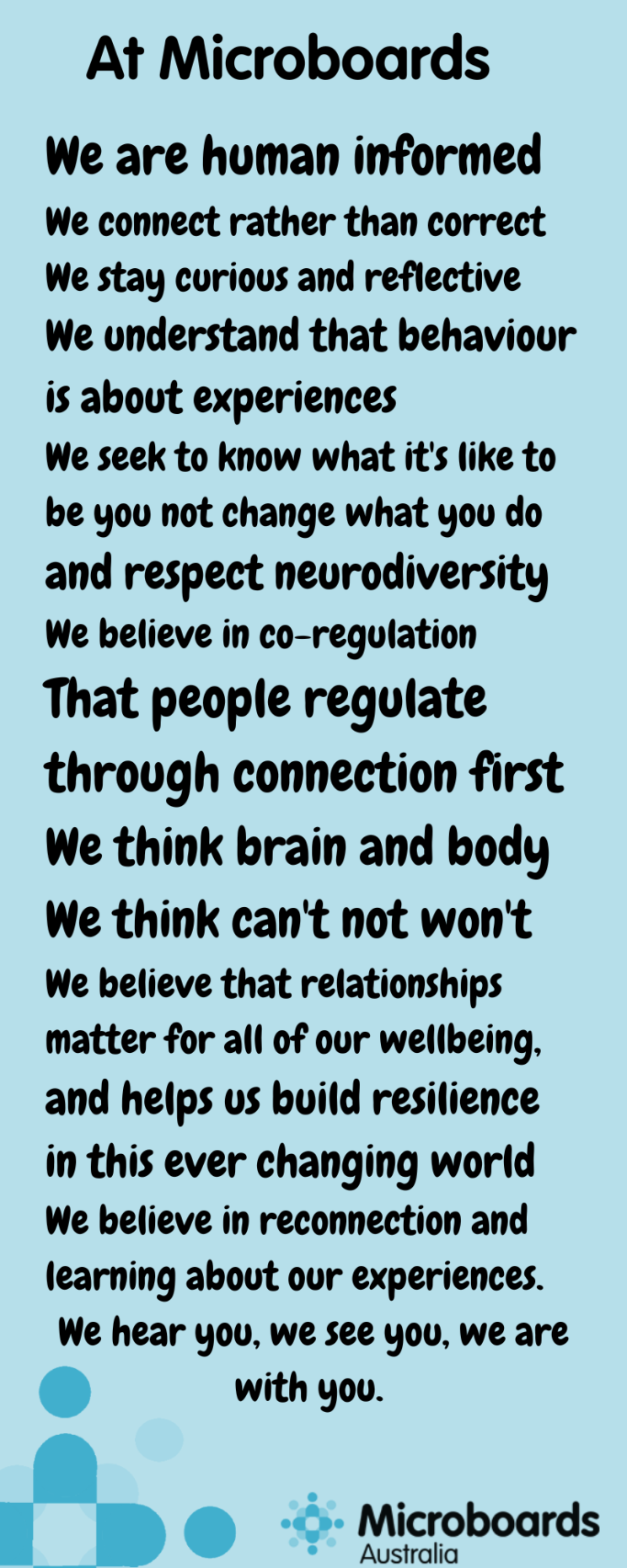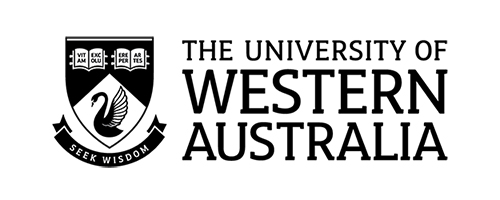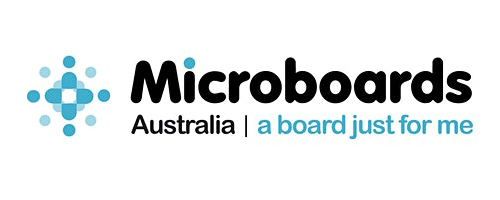Who we are
Is There a Better Way was initially established as an approach and support to families and disability support providers to understand why people may experience a need to show others they need support in ways that can place themselves and others at risk or in relation to concerns about their or other's wellbeing. We are part of the broader approach of Microboards Australia.
Led by families and people with lived experience, over time ITaBW has become synonymous with our broader approach, firmly grounded by a human rights and body and brain response to stress framework.
Some people may know we were approached to help the conversation about safeguards and restrictive practices many years ago. This is where the name Is There a Better Way originated. We are not focussed on restrictive practices though. We are about human rights and being neuroscience and regulation informed.
The ITaBW approach helps support people to develop a clearer understanding and insight into the reasons a person may experience the need to engage in responses that can be concerning for others or place themselves at risk. It is guided by the underlying recognition that the experiences or actions of a person that may trigger the concern of others results from unmet needs or at times just differences in our neurodiversity that is not understood or upheld. It is often a way of expressing the stress and distress the person is experiencing in navigating life. Our response, therefore, being to better understand what the person is experiencing, what it's like to be them and what needs they may have that has led to this ongoing stress. We take a neuroscience and human rights approach to understanding why we respond in ways that sometimes are not in our control and how to support people to feel good, feel connected and feel in control.
Our Approach
Often the needs and experiences of people with a disability or different neurotypes can be misunderstood, ignored or overlooked. Often, in an attempt to ‘fix’ a behaviour/response, we focus on wrong things, trying to change a person and motivate a person to do something differently. Supporting a person to have a less of a need to show us they need support or for us to truly see them,however requires us to look, not at their actions but what might the person be experiencing and possible gaps in meeting their underlying needs. What would it be like to be that person from within and what is influencing their stress whether this is observable or not?
Utilising evidenced-based practice and lived experience, we delve into understanding what the person with disability is experiencing and the influencing factors, both personal and environmental that contribute to possible unmet needs or impact on our body and brain stress systems. Like an iceberg, we look at what lies underneath what the person is doing to get a deeper understanding of how to support a person’s needs and improve their wellbeing and skills over time.

ITaBW is grounded by a contemporary view of biopsychosocial approaches embedding a range of evidence-based practices. We are led primarily by a neuroscience and neurodiversity affirming lens, seeking to understand the experiences of people from what it might be like to be them from within. The main focus is to reduce the experience of anxiety, stress and dysregulation for people and to therefore improve their quality of life and relationships. We do not accept, view or use language related to any form of behaviourist notions of control or intent to change the experiences or actions of people to conform to neurotypical or 'normalised' views. We strive to be culturally respectful and person led in seeking to define experiences and needs from a person's values, culture, history and stories.
ITaBW seeks to support people to feel in control, connected and heard.
It seeks to support people to be firstly be themselves and for others to see them and adjust their support to reduce their stress and challenges an ableist environment imposes. We also seek to support people to be ABLE to adapt or learn new skills that make sense to them as lifelong learners by reducing stress and increasing the brain and the body’s capacity to cope.
The knowledge of ITaBW founders in communication, health, human rights, regulation and behaviour support ensures that ITaBW is unique in its approach to better understand the underlying needs of people and how to therefore develop lifelong supports. The ITaBW framework has evolved over time into a robust model of practice that underpins the approach utilised by all employees.
It is also the foundation for the development of family leadership in behaviour support across WA. You can find out more about family leadership through contacting the Side By Side Program at DDWA.
Microboards practitioners, facilitators and families avoid using terminology that does not respect the person, does not capture their voice and does not really see them. We strive towards partnership ways of supporting people, being person led and calling co-design.
We rarely use language that talks about behaviour, rather we talk about what's going on for you and what do you need for things to be better for you. If we wouldn't like something written about our own children then we won't do this for you.
At times, we do need to use NDIS regulatory language to meet NDIS identified standards of support. We will explain where this needs to happen and will always continue to work with people and families to ensure we have alongside support processes that is directed by you and in ways that is accessible and makes a difference.
Why language matters
Our Partnerships

University of Western Australia
The Is There a Better Way family program has been independently evaluated by the Business School at the University of Western Australia. We have done this twice! Once with our face-to-face training program and now with our online learning program. You can access the results of these evaluations by clicking the UWA logo.
Overall, most families who have attended our programs have reported significant changes in their relationships, wellbeing, capacity to cope, vision for the future and development of skills for both themselves and their loved ones with a disability. Most importantly they experienced positive change and felt empowered to continue to create change into the future.
Microboards Australia
ITaBW is a service arm of Microboards Australia. Microboards Australia provides a range of services to families who may have a family member with disability to develop a Microboard, to provide general support, training, advocacy and to support a sector-wide change to uphold the human rights of people with a disability. Broadly, a Microboard is a sustainable network of unpaid relationships with a strong values-based culture committed to the Social Model of Disability. Microboards takes each network through a detailed formation process culminating in incorporation to create a not for profit association supporting just one person & which legally mandates adherence to microboard principles in person-centred thinking, vision, robust communication needs supports, social inclusion, self-determination and supported decision making, risk management and dignity of risk, full citizenship, safeguarding, medical planning, futures planning, advocacy, governance, and recruitment. You can find out more by accessing our main Microboards Australia website. Just click on our logo and we will take you there!
Want to find out more? Drop us a line!

